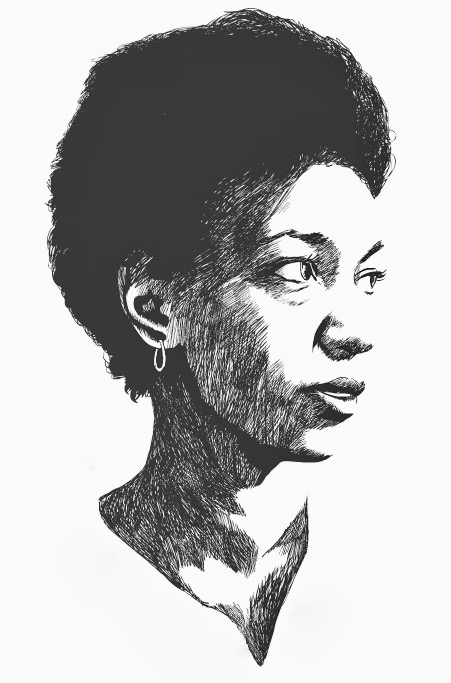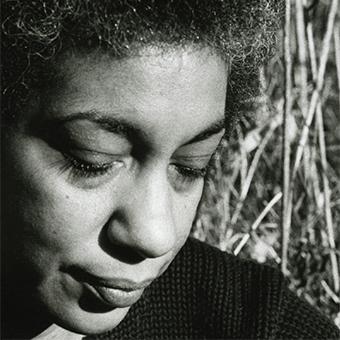“Case in Point” by June Jordan

Drawing of June Jordan
June Jordan addresses the trauma of rape from an intersectional perspective: she is a woman but she is also black. Her title, “Case in Point,” uses legal language to state her point that the patriarchy’s depravity uniquely cripples women, especially women with intersectional identities, through a demonstrative example. Rape is that example. Jordan argues through ethos and pathos that rape is a case in point that proves that the patriarchy brutally silences women.
Through a casual tone, Jordan utilizes ethos to present the narrator as a credible source to a skeptical audience. The first evidence of such occurs on lines five and six: “there is no silence peculiar / to the female” (Jordan, lines 5-6). While the words themselves create a conversational tone, they serve the purpose of explaining an extreme scene of sexual violence. By doing so, Jordan starts to achieve the ethos she needs in order to be heard and taken seriously. Being a female African American, Jordan was well aware of the stereotypes and prejudices that stood in the way of her narrator. Women were often branded as being hysterics creatures, so if the narrator entered into the topic matter with a destructive, emotional tone, her words would have been pronounced as nothing more than girlish babble and her argument cast aside. If Jordan portrayed the narrator as exuding too much femininity, the argument would have lost credibility. Jordan uses irony to prevent such an occurrence. “I have decided I have something to say” (Jordan, line 7) breaks the silence in a matter of fact voice that is both nonchalant and definitive. Once again, Jordan enters into a grim topic through irony. Nonchalance allows the narrator to come across as non-threatening. She merely “decided” that she has “something to say” and anyone is free to listen at their own will. When people are commanded to do something, often their first impulse is to rebel against it. When people are invited to do something, often they are more inclined to accept. When people are told something is going to happen and they are not commanded to join nor offered an invitation, often, curiosity and the human desire for inclusion leads them into action whether they realize it or not. Jordan does precisely that. “I have decided I have something to say” is a declarative sentence, presenting only the fact that the narrator has “something to say” and will most likely say it. The narrator does not demand the audience’s attention nor does she invite the audience to listen; thus, her resolve and indifference tickles the audience’s curiosity and draws them into her words. Jordan begins the final stanza with the shortest sentence in the entire poem: “he was being rhetorical” (Jordan, line 35).This quippy line follows a lengthy description of a horrifying incident, and in the context of the preceding question, “d’ya want to swallow my big dick; well, do ya?” (Jordan, lines 23-4) the line appears to state the obvious, but it serves a much greater purpose. After reliving the entire traumatic incident, the narrator returns immediately to a matter-of-fact tone. Jordan achieves ethos in this line. Jordan proves that the narrator is not an unstable little girl whining about a man hurting her, but a clear-headed adult, stating the facts of her case. Because Jordan the narrator’s credibility, so too is her argument made credible, thus, audience becomes inclined to pay attention.
Finally, through various poetic devices, Jordan utilizes pathos to let the reader’s emotions

June Jordan
inspire a changed perspective. Pathos evokes empathy. Empathy catalyzes action. Action prompts change. But pathos is a difficult element to master, for the line between too much and too little is fine. “I was raped for the second / time in my life the first occasion / being a whiteman and the most recent / situation being a blackman actually / head of the local NAACP” (Jordan, lines 10-4). No punctuation breaks these lines. Not even a period concludes this stanza. The repeated enjambment makes the last line of mere description appear to be an after-thought. The fact that this line proceeds the adverb “actually” makes the information regarding the second criminal was a “blackman” and “head of the local NAACP” have a peculiar note of surprise. The NAACP was meant to protect the civil rights of black people. The narrator, a woman of color, is supposed to trust this organization and those who lead said organization. But the rape breaches her trust. Who is she supposed to turn to now? She turns to her own voice. “Whiteman” and “balckman,” like the titles of two species, are the only indicators of distinction between perpetrators. The act is the same. Hence, the colors, “white” and “black” appear separate from the act. This poem crystallizes this devastating moment in a way only poetry can. Stanza 2 describes the episode in graphic detail. “Stradling,” (Jordan, line16) unclear whether acting as a participle or a verb, and “forcing,” (Jordan, line 19) describing “his […] powerful left hand,” (Jordan, line 18) are both present sense and in action. “Stradling” and “forcing” speed up the scene until “while” (Jordan, line 20) breaks the rhythm and the past tense verbs “rammed,” “described,” and “shouted” reduce the last lines to a crawl. The languid pace weighs down the final lines; their significance becomes unavoidable and sobering. While the lines “he rammed / what he described as his quote big dick / unquote into my mouth” (Jordan, line 20-23) explains the rape literally. The fact that the following words, “and shouted out” (Jordan, line 24) continue with the same pace and tense indicate that the question the man shouts and the silence that follows is too part of the rape. This entire scene, the ebb and flow of the cadence and the crushing progression of violence brought to life with each poetic device, throws the reader into the scene with the rape victim.
Just as the title “Case in Point” suggest, the narrator’s argument is proved within the example itself. Her argument being that rape is an example of society’s depravity.
Sources:
Moore, Honor. Poems from the Women’s Movement. Library of America, 2009.
“June Jordan, Genre Fiction, and Publishing for the People.” The Feminist Wire, https://thefeministwire.com/2016/03/poetry-for-people/.
“The Occupation Stole My Words, June Jordan Helped Me to Relocate Them.” The Feminist Wire, https://thefeministwire.com/2016/03/june-jordan-and-israeli-occupation/.
